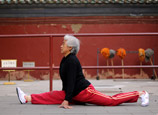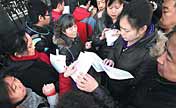
A claim that kettles were removed from the rooms of Chinese guests at a luxury resort in the Maldives to stop them eating instant noodles instead of hotel meals was denied yesterday.
The hotel said the claim came from a disgruntled former Chinese worker refused a contract because of poor performance during a trial period.
According to the South China Morning Post, Zhao Jianke said staff at the five-star Beach House Iruveli resort were asked to remove kettles from Chinese guests' rooms after the appointment of a new general manager in December.
Zhao said the new general manager referred to China as "cup noodle" in public because of its "CN" acronym.
"The information is absolutely wrong," Indika Manoj, the resort's front office manager, said yesterday. The hotel had never discriminated against tourists from China.
Some kettles had been removed, she said, because they had been damaged by guests using them to boil food, but that was just routine maintenance.
She said Zhao had worked in the hotel's front office for less than three months, and he wasn't kept on because he did not perform well.
Furious reaction
Manoj said the hotel had not witnessed a drop in the number of Chinese tourists because of the allegation, which Zhao first aired in an online post on March 1.
Between then and this Monday, the resort had received 314 Chinese guests, about the same number as last year in the same off-season period.
Yesterday, there were 29 Chinese tourists among the hotel's 95 guests, she said.
Zhao's post sparked a furious reaction from Internet users in China. Some people called for a boycott of the resort, while some potential tourists said they would not be going to the Maldives until the resort apologized.
Chinese tourists are now traveling more and farther, but while contributing to a booming tourism market elsewhere, their behavior has come under some scrutiny.
Reports in the Maldives media posted online said that despite Chinese people accounting for almost a quarter of all visitors to the Indian Ocean island nation in 2012, many resorts regarded Chinese guests as relatively "low-yield" due to low spending on extras such as food and drink, but they were welcome as they boosted occupancy rates during the off-season.
Ahmed Adheeb, the Maldives tourism minister, said no formal complaints had been received by authorities over alleged discrimination at the country's resorts, but such incidents were taken seriously.
A seven-day stay at Beach House Iruveli costs 20,000 to 30,000 yuan (US$3,200-US$4,800) with air tickets included, according to a travel agency in Shanghai.
City travel agencies said reports of discrimination against Chinese tourists at hotels in the Maldives were "very rare."
Some tourists took instant noodles to India to eat due to concerns over hygiene, but such things should not happen in the Maldives, said Yang Yanping, manager of the Asian department at Shanghai China Travel International Co Ltd.
Dai Mingyu, a Shanghai resident who was a guest at the resort in November, said he did not encounter unfair treatment. "I think its service and facilities are good," Dai said.
In 2011, some 20,298 Shanghai residents booked holidays in the Maldives, 18 percent up on the previous year.
















 Year's first rainfall for Beijing
Year's first rainfall for Beijing


![]()
